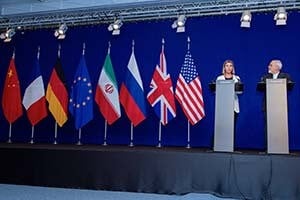 The Obama administration secured enough Senate support Wednesday for the Iran nuclear deal, guaranteeing Republicans won't stymie the vote when it reaches Congress next week.
The Obama administration secured enough Senate support Wednesday for the Iran nuclear deal, guaranteeing Republicans won't stymie the vote when it reaches Congress next week.
Maryland Democrat Barbara Mikulski became the 34th senator to support the deal on Wednesday, ensuring a landmark victory for the Obama administration.
Senator Mikulski's backing means at least 34 senators - the number required by the Constitution to sustain a veto - will back U.S. President Barack Obama's expected veto of a Republican resolution to disapprove the deal. The Maryland senator, serving since 1987, will retire at the end of her term.
Secretary of State John Kerry said the administration will keep pushing support for the deal beyond the 34 votes they have now "until the last moment." The Democratic administration is aiming to accumulate 41 votes, which would spare President Obama from having to use his veto power.
"Thirty-four votes are obviously enough votes for the president's veto to be upheld," Kerry told CNN. "That is not satisfactory for us. We do want to try to go further. We'll continue to persuade."
Kerry continued, "It's hard to conceive of a quicker or more self-destructive blow to our nation's credibility and leadership" than a vote against the agreement, known as the Joint Comprehensive Plan of Action (JCPOA).
The secretary of state also sought to dismiss myths about the Iran nuclear deal. He said rumors had begun to swirl "even before the ink was dry."
On the top of his list was the belief the Iran nuclear deal was based on trust.
"There is a not a single sentence or paragraph in this whole agreement that depends on promises or trust. Not one," Kerry said.
Kerry insisted Iranian compliance would be monitored by an unprecedented and hi-tech surveillance regimen installed by the UN nuclear watchdog, the International Atomic Energy Agency (IAEA).
Kerry claimed the deal would make the world safer - including Israel and the Persian Gulf states.
Republicans, however, disagree.
Iran Nuclear Deal Opposition Remains Strong
Almost all Republicans oppose the Iran nuclear deal.
GOP members argue the agreement's standards are weak and don't adequately allow international inspectors to monitor whether Iran is complying with the agreement. They maintain this deal will allow Iran to build nuclear weapons in a few years.
Just two Democratic senators have voiced their opposition to it. They are Chuck Schumer of New York and Bob Menendez of New Jersey.
The Senate's 54 Republicans need four more Democrats to join them in opposing the deal to ensure the bill will fail when it heads to Congress.
GOP policymakers believe the historic deal should have a final up-or-down vote.
An up-or-down vote, or a clean vote, describes a direct vote in the House or Senate on an amendment or bill. Members vote "yea" or "nay" on the matter rather than voting on a related procedural maneuver. Depending upon the rules of order for the particular bill or amendment, the votes required for passage may be a two-thirds majority, a three-fifths majority, or a simple majority.
The Iran nuclear agreement took years for the United States and five other world powers to put together and agree on. Called P5+1, these global powerhouses include the U.S., UK, France, Germany, China, and Russia.
The complex and technical agreement only emerged after years of diplomacy and a final marathon negotiation session by top diplomats over three weeks in June and July in Vienna.
Still, the Iran nuclear deal continues to stir heated debates among U.S. policymakers.
GOP leaders have not announced the date voting will take place. Votes are expected after lawmakers return from a summer recess next week, before the statutory deadline of Sept. 17 for Congress to act on the deal.
Stay informed on what's going on in the markets by following us on Twitter @moneymorning.
Related Articles:


